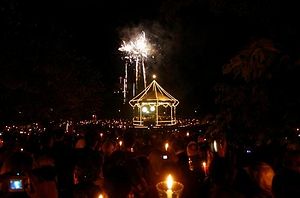There
are few opportunities like Holy Week to gain
empirical knowledge and partake in the Philokalic
(love of beauty) Hellenic tradition that masterfully
comes to life each year in Greek Orthodox churches
and homes all over the world. The Orthodox Christian
mentality is expressed in our persistent focus on the
Resurrection. While various creeds follow the
Passion, and even honor it, they view it within the
narrow prism of “The satisfaction of God's
divine anger,” and their churches remain silent
after Good Friday. In the Orthodox Church, the Holy
Passion is venerated, because it illuminates what is
to come; because the faithful know that after the
Cross comes the Resurrection! This was and will
remain the good news that Orthodoxy preaches to the
world. It’s this very “good news”
that Greek tradition has sought to identify itself
with. Since ancient times, Hellenism has stood out
for its ability to “organically digest”
new elements and incorporate them into its existence.
It is no surprise that it lends its full passion and
grace and abilities towards glorifying the greatest
of all such elements: the voluntary self-sacrifice of
the Incarnate God and His subsequent Resurrection, to
save mortals from death. Famous Greek author
Alexandros Papadiamantis (widely known as the
Dostoevsky of Greece) – whose 100-year memorial
anniversary is being widely commemorated this year
– describes Holy Week most eloquently in so
many of his short stories and articles:
“… the incense drifts in blue fragrant
wreaths and forms a fleeting surround for the girls,
in their embroidered aprons and white sleeveless
jackets, come bearing armfuls of roses and violets
and sheaves of rosemary and proceed to heap mountains
of flowers on the humble Epitaphios, which needs no
further embellishment.” In her blog This Side
of Glory, the author Grace discusses this beautiful
short story (A Village Easter), noting, “Who
doesn’t know what he means? The liturgical
worship we have looks so serious to our Protestant
friends that they never guess how very human it can
be — laughter and tears and all the rest that
are forever tinged in my memory with the most sacred
and eternal aspects of worship.”
In an article on Pascha, Papadiamantis
compares the joy that the Church feels over the feast of
Pascha to an inexplicable “inebriety” that a
bride feels upon regaining her groom. “The Greek
people feel this sublime drunkenness in their hearts more
than any other people. No other Christian holiday holds
that place that Pascha holds for them. The Westerners have
Christmas. We have Pascha. It is the queen of all holidays
and the feast of feasts.” He goes on to note that
“the Greek nation’s Pascha rises and sets with
the noisy dispersion and supreme exultation of the people,
who still have drops of blood running in their veins from
their wild and unbridled ancestors, who are lulled by the
love of freedom.”
Papadiamantis notes that, “When
the Greek people say the word Resurrection, a secret chord
is struck in the depths of their heart, reminding them of
the Resurrection of the nation as well, and Christ and
Country meet together, equally suffering and equally
divine. And when the Greek people say the word Love
(Agape), they are speaking the sweetest of words,
preeminently underscored in the Gospel and proclaimed in
the teachings of St. Paul, which has remained in the Greek
language as the quintessential passionate and heartfelt
word, by which every affection, and every romantic
feeling, and every devotion are expressed. Nothing is
separated in the Greek tradition. That’s why the
Crucifixion cannot be seen separately from the
Resurrection. That’s why there’s no place for
Puritanism in Orthodoxy. Pascha is a combination of
sublime hymns, prayerful devotion, drama, as well as
fireworks, dancing, celebrations, delicacies, and local
traditions that vary from village to village and parish to
parish. Pascha encompasses our lives – and for one
week, it becomes our life, pointing to a more perfect way
of living. Papadiamantis sums it up the best: “For
my part, as long as I live and breathe and am of sound
mind, I will never cease, especially during these
resplendent days, to praise and adore Christ, to depict
nature lovingly, and to represent with affection those
customs which are authentically Greek.” Christos
Anesti!
The
National Herald

